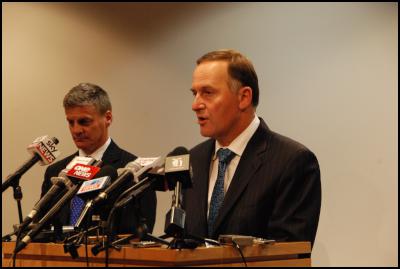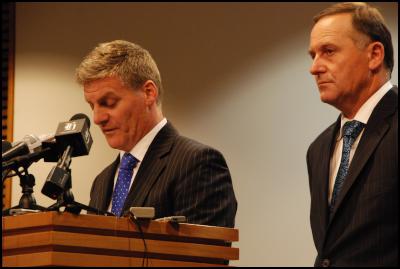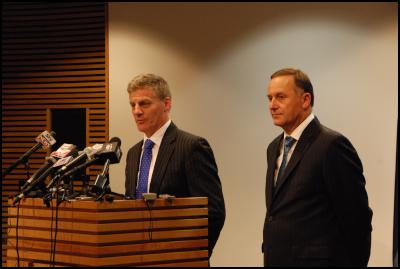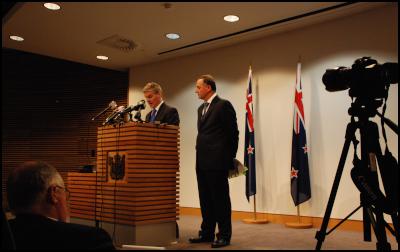Affordability: Govt on Housing and Land | Questions on GCSB
Post-Cabinet Press Conference - Prime Minister with Hon. Bill English - 29 Oct 2012
By Mark P. Williams

Today the Prime
Minister was joined at his regular post-cabinet press
conference by the Finance Minister, Hon. Bill English to
talk about the Productivity Commission's recommendations on
housing affordability. The Prime Minister said that the
government had decided to adopt almost all of the
commission's recommendations. He said that the Productivity
Commission was asked to report out of concern that "getting
on the home ownership ladder was proving too high a stretch
for too many New Zealanders" and because it was important to
the wider economy. He said that the present measures to be
adopted were part of the Government's drive to make the New
Zealand economy more competitive.
The Finance Minister said that on current trends fewer New Zealanders will own their own home
He said that home ownership peaked in the 1990s at around 75% and that it is currently 65%, the average for the OECD. He said that costs are too high at every level of the process starting with land availability.
The Finance Minister said that the Government intends to work with councils to make housing more affordable and reduce large burdens of debt; he added that the Reserve Bank puts current household debt at around $188bn. He also said that New Zealand's levels of private sector borrowing ranked it alongside European countries "in terms of overall indebtedness" but did not elaborate the comparison further.
He said that the supply of houses is "simply not as
responsive as it could or should be".
He emphasized four
key areas in particular, which the Commission's report had
identified and the government concurred with:
- Land supply;
- Costs and delays of regulatory processes;
- Timely provision of infrastructure to support new housing; and
- The cost and productivity of the construction sector.
He said that the government was working in a variety of ways to "reduce the costs and complexities that hinder development" and "restrain house prices in the medium term" without adversely affecting local decision making.
He emphasized that the housing market is not something that the government controls directly but spoke of providing greater direction to local government and reduce costs, delays and problems with Building Consents.
He said the specific instances of Auckland and Christchurch would require more particular advice and added that, nationally, none of the problems would be fixed overnight.
Click a link to play audio (or right-click to
download) in either
MP3 format or in OGG
format.
Questions to the Finance
Minister
The Finance Minister was asked whether the government had considered either
- Low-interest loans, or
- Auctions of land where land developers take greater profits out of subdivision of land.
He responded that the government was not looking at loans but was addressing problems "much earlier in the pipeline". He insisted that those measures were "masking an underlying problem".
The Finance Minister was asked whether he agreed with Bob "the Builder" Clarkson of Tauranga who had suggested a way to fix the problem using low-interest loans which would make an "overnight change" to the way housing was managed. Mr. English responded that he would be "keen to hear what that overnight change would be" see that proposal and was told that the proposal had already been submitted—the Finance Minister then changed tack, saying instead that the government does not necessarily agree with all of the submissions made.
The Finance
Minister was then asked why the government had not looked
into opening up large tracts of land around Christchurch to
create what were essentially "subsidized sections" rather
than allowing existing land owners to keep prices high.
The Finance Minister was asked what he meant by "restraining prices" and whether he had a particular target in mind. He said that the govt was still deciding what tools to use.
Mr. English was then asked what Mayor Len Brown had said to Mr. English about housing in Auckland. He said that he had had very constructive discussions with Auckland city.
The Finance Minister was asked whether he was confident that accelerating the Consents process would not compromise build-quality. He responded that he was confident that they could reduce the cost of standardized housing without adversely affecting quality.
The Minister was asked about what kind of time frame the proposed changes were likely to happen within. He said that it would start over the next few months. He was then asked how the government responded to the recommendation that land be released around Christchurch and Auckland immediately. He said that there was a "working experiment" in the case of Christchurch and that the government was balancing many complex factors.
Mr. English was then asked what would happen if councils ignored the government's objectives.
The Finance Minister was next asked why he would leave the planning and housing problem in the hands of councils when for the last ten years they have been part of the problem. In response the minister emphasized the importance of local knowledge in tackling these issues.
Mr.
English was asked how he would deal with developers, given
that it was still in developers' commercial interest for
developers to hold land back for profits. He responded that
it was a question of "creating enough opportunities" to
force developers to develop.
The Finance Minister was asked whether government would legislate to compel uncooperative councils to help free land for affordable houses. Mr. English responded by saying that the government considered affordable housing very important to the wider economy and "we'd like to work with them so the larger interest is clear to them". He also said that the government was looking towards changing "the rules" to make housing more affordable. Pressed further he added that he would expect to see changes to the Resource Government Act and Local Government Act to promote affordable housing.
The Minister was asked whether we could anticipate an SOP. He responded that he couldn't comment in detail but did expect legislative changes.
The Finance Minister was then asked whether he had approached the opposition parties about housing affordability policy. He began to say that they "tend to focus on subsidizing the rents and the mortgages", while the government wanted to focus on the planning, but acknowledged that the government had not consulted the opposition on the matter.
The Finance Minister was asked what young people seeking to gain a foothold on affordable housing could actually expect other than promises. He responded that they could make their views known to their councils and their councilors that they would like to see something done on the issue. He indicated that a lot of the changes could take three years before the significant changes to the planning processes began to take effect.
The Minister was asked to clarify whether Aucklanders trying to find affordable housing would be forced to wait three years. He responded that that was as much a question for the councils as for the government.
The Finance Minister was asked whether he had considered caps on loan-value ratios on housing. He responded that he did not feel it was a useful way to deal with the issue.
The Minister was asked how much of a systemic risk high housing prices place on the New Zealand economy. He said that they are a high risk and had generated the largest threat to New Zealand economically, namely that New Zealand is "one of the most indebted household sectors in the developed world".
The Finance Minister was then asked about Social Housing and what was the logic of transferring ownership from Housing New Zealand to the Community Housing Sector and how was doing so supposed to grow supply. He said that they were doing some experiments in terms of moving housing stock, adding that we would see careful but continued change in Social Housing.
Mr. English was then asked about housing subsidies. He said that he wanted to "transition" those most vulnerable people who were dependent on housing subsidies into "a state of independence" saying that the government would look at some sort of "requirements" before it would give out a subsidy.
###
The PM then outlined his week for the press and took questions on other matters. These questions were immediately dominated by the questions still hanging over the GCSB and SIS in the matter of Kim Dotcom.
Questions to the PM
The PM was asked whether either Mr. Roy Ferguson or Mr. Warren Tucker was advised on the matter of Kim Dotcom. He responded that Mr. Tucker was not advised, and that SIS did their "routine, standard enquiry", that it was very much an "operational matter" and that one agency, the FBI, indicated that Mr. Dotcom might be of interest to them but would not have required special attention.
He was then asked whether he would have expected the SIS to have raised the matter of the FBI interest in conducting a joint investigation with New Zealand police, with immigration when they were undertaking security assessment of Kim Dotcom. He responded that this was a question of "standard procedures" which was handled at "a pretty low level".
He was then asked if it was usual for the FBI to take an interest in a New Zealand immigration case. He responded that he could not confirm that.
The PM was then asked whether, as Minister for the SIS and GCSB, he could find out when Mr. Tucker had become aware of the fact that the FBI was investigating a New Zealand resident.
It was pointed out to the PM that it appeared as though the SIS and GCSB were failing to communicate with one another over important matters.
The PM was asked about the incidences of suicide, referred to as an "epidemic", in Northland communities and whether he felt that poverty was a factor. He responded that there were many complex issues at work regarding youth mental health issues. He would not be drawn on the extent to which poverty and deprivation were determining factors.
The PM was asked about the latest privacy breach by the IRD and how the IT issues were being dealt with. He acknowledged that there were serious problems and that it was "a pig of a system" but that these problems were not new issues.
The PM was asked whether he felt New Zealand was a sexist country, particularly with respect to the business world. He responded that he felt New Zealand was not in general but that there were still key improvements to be made.
Finally, the PM was asked whether there was anything that could be done to help the families involved in the Villagio Mall fire in Doha, Qatar. The PM responded that intervention was the last card he would play and if he were to intervene. Although he would not rule out intervening he said he felt it was something best handled by the Minister for Foreign Affairs.



Click for big version.
ENDS



 Richard S. Ehrlich: China's Great Wall & Egypt's Pyramids
Richard S. Ehrlich: China's Great Wall & Egypt's Pyramids Gordon Campbell: On Surviving Trump’s Trip To La La Land
Gordon Campbell: On Surviving Trump’s Trip To La La Land Ramzy Baroud: Famine In Gaza - Will We Continue To Watch As Gaza Starves To Death?
Ramzy Baroud: Famine In Gaza - Will We Continue To Watch As Gaza Starves To Death? Peter Dunne: Dunne's Weekly - A Government Backbencher's Lot Not Always A Happy One
Peter Dunne: Dunne's Weekly - A Government Backbencher's Lot Not Always A Happy One Richard S. Ehrlich: Cyber-Spying 'From Lhasa To London' & Tibet Flexing
Richard S. Ehrlich: Cyber-Spying 'From Lhasa To London' & Tibet Flexing Gordon Campbell: On Aussie Election Aftershocks And Life Lessons
Gordon Campbell: On Aussie Election Aftershocks And Life Lessons